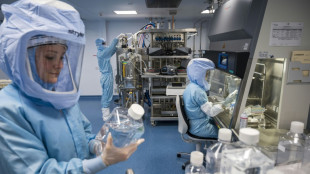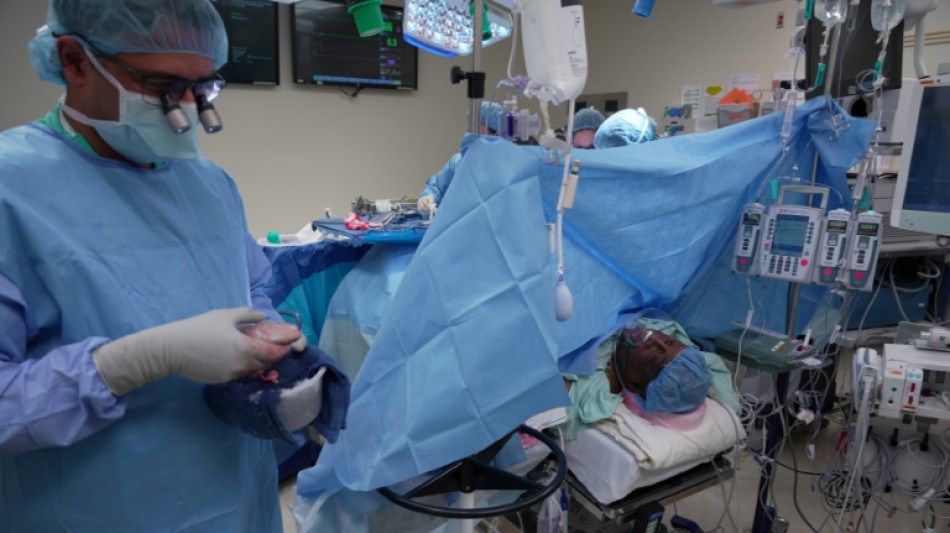
-
 Iran delegation in Oman for high-stakes nuclear talks with US
Iran delegation in Oman for high-stakes nuclear talks with US
-
Australia beat Colombia to end BJK Cup bid on winning note

-
 German refinery's plight prompts calls for return of Russian oil
German refinery's plight prompts calls for return of Russian oil
-
Trump carves up world and international order with it
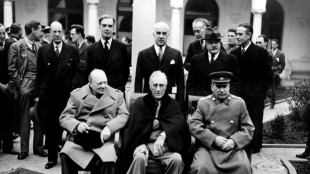
-
 Paris theatre soul-searching after allegations of sexual abuse
Paris theatre soul-searching after allegations of sexual abuse
-
US, Iran to hold high-stakes nuclear talks

-
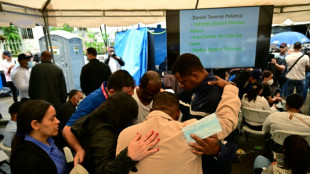 Frustrated families await news days after 222 killed in Dominican club disaster
Frustrated families await news days after 222 killed in Dominican club disaster
-
Jokic triple double as Denver fight back for big win

-
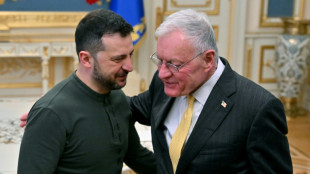 Trump envoy suggests allied zones of control in Ukraine
Trump envoy suggests allied zones of control in Ukraine
-
Iraqi markets a haven for pedlars escaping Iran's economic woes

-
 Chinese manufacturers in fighting spirits despite scrapped US orders
Chinese manufacturers in fighting spirits despite scrapped US orders
-
Argentina receives $42 bn from international financial institutions

-
 Menendez brothers' resentencing can go ahead: LA judge rules
Menendez brothers' resentencing can go ahead: LA judge rules
-
'Hard on the body': Canadian troops train for Arctic defense

-
 Trump, 78, says feels in 'very good shape' after annual checkup
Trump, 78, says feels in 'very good shape' after annual checkup
-
McKellar 'very, very proud' after 'Tahs tame rampant Chiefs

-
 Man executed by firing squad in South Carolina
Man executed by firing squad in South Carolina
-
Defending champ Scheffler three back after tough day at Augusta

-
 Ballester apologizes to Augusta National for relief in Rae's Creek
Ballester apologizes to Augusta National for relief in Rae's Creek
-
Scorching Coachella kicks off as Lady Gaga set to helm main stage

-
 McIlroy, DeChambeau charge but Rose clings to Masters lead
McIlroy, DeChambeau charge but Rose clings to Masters lead
-
Langer misses cut to bring 41st and final Masters appearance to a close

-
 Ecuador presidential hopefuls make last pitch to voters
Ecuador presidential hopefuls make last pitch to voters
-
Rose knocking on the door of a major again at the Masters

-
 DeChambeau finding right balance at Augusta National
DeChambeau finding right balance at Augusta National
-
Spurs leaker not a player says Postecoglou

-
 All Black Barrett helps Leinster into Champions Cup semis
All Black Barrett helps Leinster into Champions Cup semis
-
Round-two rebound: Resilient McIlroy right back in the Masters hunt

-
 Asset flight challenges US safe haven status
Asset flight challenges US safe haven status
-
Menendez brothers appear in LA court for resentencing hearing

-
 McIlroy, DeChambeau charge as Rose clings to Masters lead
McIlroy, DeChambeau charge as Rose clings to Masters lead
-
UN seeks $275 million in aid for Myanmar quake survivors

-
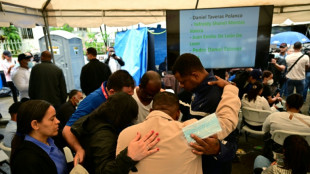 Frustrated families await news days after 221 killed in Dominican club disaster
Frustrated families await news days after 221 killed in Dominican club disaster
-
Trump wants to halt climate research by key agency: reports

-
 Fed official says 'absolutely' ready to intervene in financial markets
Fed official says 'absolutely' ready to intervene in financial markets
-
Slumping Homa happy to be headed into weekend at the Masters

-
 Morbidelli fastest ahead of cagey MotoGP title rivals in Qatar practise
Morbidelli fastest ahead of cagey MotoGP title rivals in Qatar practise
-
Musetti stuns Monte Carlo Masters champion Tsitsipas to reach semis

-
 Abuse scandal returns to haunt the flying 'butterflies' of Italian gymnastics
Abuse scandal returns to haunt the flying 'butterflies' of Italian gymnastics
-
Trump defends policy after China hits US with 125% tariffs

-
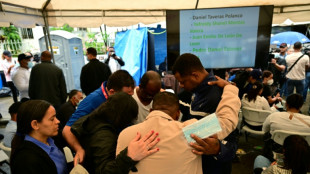 Frustrated families await news days after Dominican club disaster
Frustrated families await news days after Dominican club disaster
-
McLarens dominate Bahrain practice, Verstappen rues 'too slow' Red Bull

-
 Eight birdies rescue Masters rookie McCarty after horror start
Eight birdies rescue Masters rookie McCarty after horror start
-
RFK Jr's autism 'epidemic' study raises anti-vaxx fears
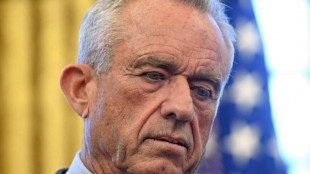
-
 Trump -- oldest elected US president -- undergoes physical
Trump -- oldest elected US president -- undergoes physical
-
Rose clings to Masters lead as McIlroy, DeChambeau charge

-
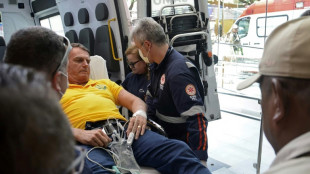 Brazil's Bolsonaro hospitalized with abdominal pain, 'stable'
Brazil's Bolsonaro hospitalized with abdominal pain, 'stable'
-
Canada, US to start trade talks in May: Carney

-
 Six arrested for murder of notorious Inter Milan ultra
Six arrested for murder of notorious Inter Milan ultra
-
Pig kidney removed from US transplant patient, but she set record


Could awake kidney transplants become the norm?
"I saw everything," says 74-year-old Harry Stackhouse from Illinois, who was awake during his recent kidney transplant. He felt no pain as he chatted with doctors, examined the donor organ, and watched the surgical team staple him back up.
Stackhouse was discharged just 36 hours after the procedure at Northwestern Medicine, which aims to make transplants without risky general anesthesia commonplace.
Performed in a little over an hour on July 15, this was the second such surgery led by Satish Nadig, director of the Chicago-based hospital system's Comprehensive Transplant Center. He has since carried out a third.
"We're at an inflection point in transplantation today in being able to use the technologies that we have around us to really push us into this next era," Nadig told AFP.
It may sound off-putting or even scary, but the medical benefits of using a spinal anesthetic for kidney transplants -- similar to what's already done during cesarean sections -- are well established.
General anesthesia requires intubation, which can damage the vocal cords, delay bowel function, and cause "brain fog" that persists, particularly in older patients.
But while the medical literature mentions a smattering of awake kidney transplants going back decades across several countries, it's never been fully embraced.
This year marks only the 70th anniversary of the first successful live donor human kidney transplant, Nadig points out, and there's been reluctance to challenge the status quo.
"However, now the outcomes for kidney transplantation are fantastic and it's time that we question the paradigms that we have historically stuck to."
- Life restoring -
Stackhouse, a father-of-six who worked as a painter and decorator, says he first fell ill in December 2019 with flu-like symptoms, which worsened to the point he could barely walk.
A few months later he ended up in the emergency room, where he learned he not only had Covid-19 during the most dangerous early phase of the pandemic, but one of his kidneys had failed and the other was functioning at only two percent.
He resigned himself to thrice-weekly dialysis sessions, but as the ports began failing and his veins started closing up, his daughter Trewaunda urged him to consider a transplant, offering to get herself tested as a donor.
Initially reluctant to "intrude" on his children's lives, Stackhouse finally agreed.
After meeting with Nadig and learning about the AWAKE Kidney Program, which uses accelerated surgery without general anesthesia in kidney transplantation, he decided to go ahead with the procedure.
"Believe it or not, I didn't feel a thing -- it was amazing," Stackhouse told AFP.
He conversed with the medical team during the operation, and when the doctor offered to show him the donor kidney, he didn't hesitate. "Man, I didn't think a kidney is that big!" he exclaimed.
Given his age, Stackhouse was discharged 36 hours later -- slightly longer than the first awake patient Nadig operated on in May, who left after 24 hours, but still much shorter than the US average of five to seven days for sedated patients.
- Who will be eligible? -
Nadig credited the success to advances like targeted anesthetic blocks in the abdomen and spine, avoiding opioid narcotics, and encouraging early eating, which had already helped Northwestern Medicine reduce patients' average length-of-stay even before the AWAKE program began.
Stackhouse has mounted an excellent recovery, reporting that he's walking, mowing his lawn, and preparing his boat for an overdue fishing trip. His recovery was even faster than 45-year-old Trewaunda's, who was under general anesthesia.
"It's just a gift that you can give someone, just to think where he was spiraling to, it wasn't looking good," the preschool teacher told AFP. "You're restoring somebody's life."
Christopher Sonnenday, director of the Transplant Center at University of Michigan Health, praised the Northwestern Medicine team for their "important innovation in our field."
"Limiting exposure to general anesthesia has been shown to accelerate recovery across all surgical disciplines, and I am certain that benefit may be realized in kidney transplantation as well," he told AFP.
But experience will determine how broadly applicable such procedures will become, including whether they will extend to patients with underlying conditions such as obesity or cardiac disease.
F.Schneider--AMWN
